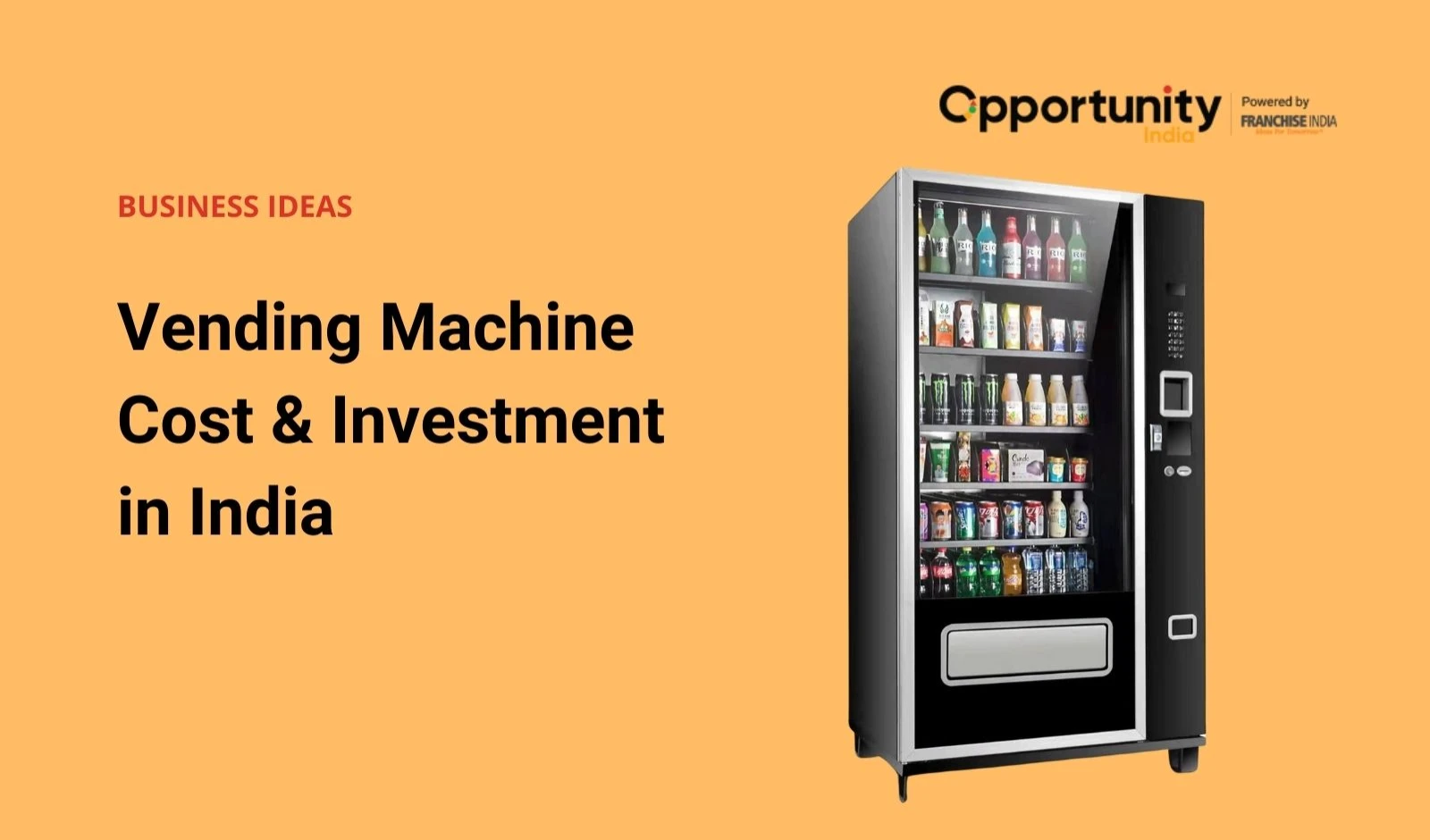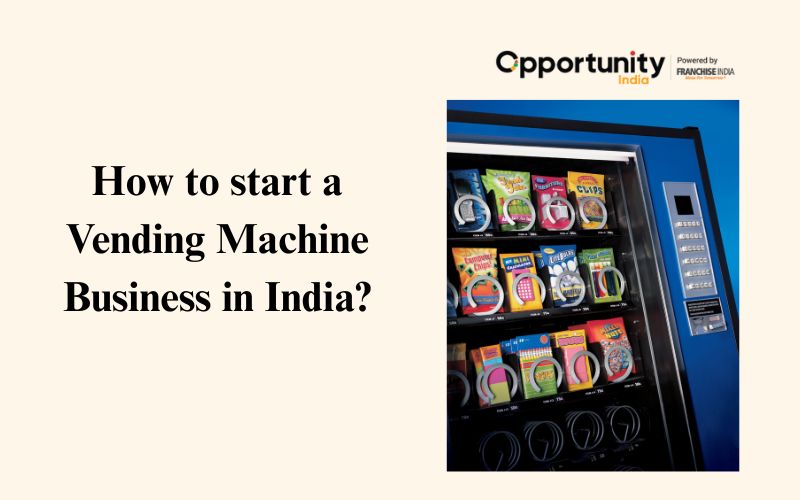
Have you ever thought of entering the vending machine market in India? From offices to colleges to metro stations, vending machines are everywhere. Starting a vending machine business in India could be an ideal business opportunity for aspiring entrepreneurs. The best thing about this business is that you don’t need a big team or a large location to establish your business. But how much investment will you need to start this business? This blog is all about cost, investment, and returns on a vending machine business in India.
The Rise of Vending Machines in India
According to a report by Mordor Intelligence, the market was valued at USD 94.45 million in 2020. It is projected to grow at a compound annual growth rate (CAGR) of 4.5% to reach USD 120.3 million by 2026. In addition, it is expected to reach USD 5,840.0 million by 2030. In India, the vending machine industry produces long-term profitability through product variety, reduced operating expenses, and steady cash flow.
India's growing middle class, rising urbanization, and trend toward on-the-go lifestyles are increasing the need for accessible shopping options. Vending machines that sell drinks, snacks, and even necessities are ideal in this situation.
Key Elements Fueling the Growth:
Vending machine growth in India is a complex phenomenon fueled by several reasons. Here is an overview of the main factors driving this expansion:
Changing Consumer Lifestyles
The Indian middle class has become used to living a modern lifestyle, which translates into urbanization. This results in a need for easy and rapid fixes, particularly for drinks, snacks, and necessities. The urge for quick consumption is made worse by longer workdays and longer drives.
Increased Foot Traffic
As cities become more populated, high-traffic zones are being created in places like corporate offices, shopping malls, airports, and train stations. These places are perfect for vending machines, which provide convenience to a lot of people.
Developments in Technology
Vending machines are becoming easier to use and more accessible due to the usage of digital payment methods like UPI and mobile wallets. The productivity and profitability of smart vending machines are being improved by features like data analytics, inventory management, and remote monitoring.
Also Read: Pani Puri Vending Machines in India: Price & Details
Growing Retail Sector
Vending machines are becoming an additional channel for retailers looking to increase their reach as the Indian retail sector experiences outstanding expansion. They provide an affordable alternative to a typical brick-and-mortar store for reaching customers in busy areas.
Increased Demand for Convenience
People are becoming more grateful for convenience and are willing to pay more for it. Vending machines meet this increasing demand by providing a quick purchasing solution 24/7.
Corporate and Institutional Adoption
Corporate offices, hospitals, and educational institutes are becoming an active part of this revolution. They are actively placing vending machines to make things more convenient for their staff, students, and guests. This trend is playing a significant role in expanding the vending machine market.
Growth of the Niche Market
Demand for specialized vending machines that distribute goods like medications, sanitary products, or healthy snacks is rising. This enables businesses that sell vending machines to target particular populations.
Also Read: Soda Vending Machines in India
Increased Entrepreneurial Activity
Vending machines are an attractive business opportunity since they have a low entrance barrier for entrepreneurs. Entrepreneurial interest in this industry is also being fueled by the possibility of scalability and passive revenue.
Understanding the Costs of Vending Machines
In India, the amount of money needed to start a vending machine business can vary greatly depending on several factors:
Type of Vending Machine
- The most popular kind of vending machine is the snack and beverage machine, which usually costs between ₹50,000 and ₹3,00,000, depending on its brand, capacity, and features (such as cashless payment choices).
- Tea/coffee, sanitary napkin, medication, and even hot food vending machines can be far more expensive, costing anywhere from ₹1,50,000 to ₹10,000,000 or more.
- Choosing a used machine can save money in the beginning, but it's important to be sure it works and is reliable. The cost of these can vary greatly based on their condition.
Location and Installation
Profitability depends on securing a premium location. Depending on the location and size, space rental prices can vary greatly. Transportation, electrical setup, and any required adjustments are all included in the installation charges.
Inventory and Maintenance
The kind and volume of goods you intend to sell will determine the initial inventory cost. It is crucial to do routine maintenance, which includes cleaning, repairs, and restocking.
Payment systems and technology
The cost of modern vending machines may increase due to the availability of inventory management systems, remote monitoring, and cashless payment methods (UPI, card payments).
How much does a Vending Machine Cost in India?
| Type of Machine | Approx. Cost (₹) Approx. Cost (₹) |
|---|---|
| Basic Snack/Drink Dispenser | ₹90,000 – ₹1.5 lakh |
| Smart Touchscreen Vending Machine | ₹1.5 – ₹3.5 lakh |
| Imported IoT-enabled Machines | ₹4 – ₹8 lakh |
| Coffee/Tea Vending Machine (Basic) | ₹20,000 – ₹80,000 |
| Combo Machines (Snack + Hot/Cold) | ₹1.5 – ₹2.5 lakh |
The Market Trends:
- Due to rising consumer demand for convenience, the Indian vending machine market is expanding significantly.
- Vending machine attraction is increasing as a result of the use of digital payment methods.
- Vending machines now have the chance to act as useful pickup locations due to the growth of e-commerce and delivery services.
- Smart vending machines with remote management and data collection are becoming more popular.
- Market demand for specialty vending machines, such as those that offer organic goods, personalized goods, or nutritious snacks, is rising.
Investment Breakdown
- Basic Snack/Beverage Machine: ₹50,000 - ₹1,50,000
- Advanced Snack/Beverage Machine with Digital Payment: ₹1,50,000 - ₹3,00,000
- Specialized Machine (e.g., Hot Beverage): ₹2,00,000 - ₹5,00,000+
- Location Rental (Monthly): ₹5,000 - ₹20,000+ (depending on location)
- Initial Inventory: ₹10,000 - ₹50,000+
- Installation and Setup: ₹5,000 - ₹20,000
- Maintenance (Monthly): ₹2,000 - ₹5,000
- Electricity: ₹300 – ₹1,000
- Internet Connectivity: ₹200 – ₹500
- Manpower (optional): ₹8,000 – ₹12,000
ROI & Profit Margins
Average Monthly Revenue per Machine:
- High-traffic zones: ₹30,000 – ₹60,000
- Moderate locations: ₹10,000 – ₹25,000
Profit Margins:
- 25% – 35% net margin after costs
- ROI is typically achieved in 12–18 months
Also Read: Sanitary Napkin Vending Machine in India
How to start a Vending Machine Business in India?
If you have ever thought of starting your own vending machine business in India, it’s time to spark your idea. Whether you want to start a full-scale business, a side gig, or a passive revenue stream, this is the guide to starting a vending machine business in India.
Do you have a business plan?
Start by understanding the market and its trends. Find out who your potential customers are, such as office workers, students, and tourists. What would you like to sell? Determine what items to provide by analyzing their interests and wants. Look at local vending machine companies that are currently operating. Determine market gaps and chances for unique selling points. Describe your target market, product offers, pricing strategy, marketing approach, and business objectives. Make financial projections that include estimated revenue, operational costs, and startup costs. Consider where your machines will be located and the kinds of products that will be most popular there.
What are the Legal Requirements?
Register your company after deciding on a business structure (partnership, single proprietorship, etc.). Obtain a registration for the Goods and Services Tax (GST). A license from the Food Safety and Standards Authority of India (FSSAI) is required if you intend to sell food or drinks. Ask your local government for a trade license. Additional permits may be required, depending on your location and certain items.
How would you source your vending machine?
Choose vending machines that are appropriate for your location and goods. Think about things like capacity, features (including cashless payment methods), dependability, and maintenance needs. Think about new versus secondhand equipment. Choose trustworthy vending machine vendors by doing your homework. Make sure they provide quality after-sales service and compare prices.
How to select the location?
Seek out areas with plenty of foot traffic, like offices of corporations, institutions of education, medical facilities, malls, airports, and train stations. Work with property owners to negotiate advantageous rental agreements. Think about things like responsibilities, rental terms, and rental expenses.
Also Read: How to get a Vending Machine on Rent in India?
Inventory Management
Create a supply chain by acquiring goods from reputable vendors. Make sure to strike a deal on reasonable costs. Put inventory control into practice by creating a method for monitoring stock levels and replacing equipment. Reduce waste and product spoilage.
Maintenance and Operations
Make sure that machines receive new supplies regularly. To keep machines in good operating condition, do routine maintenance. Fix any issues as soon as they arise. Keep the area surrounding the equipment tidy and sanitary.
Methods of Payment
In addition to cash, provide card and UPI payments as well as cashless payment choices. Make sure that payments are processed securely to safeguard client information.
Customer service and marketing
Promote your vending machine business online and with signs. Respond quickly to consumer concerns and questions. Provide replacements or refunds for faulty goods.
Are you ready to start your own vending machine business in India? This is the exact guide you needed to begin your journey. India's vending machine industry is still in its early stages, although there are many prospects in both urban and semi-urban areas. With little expense, a properly positioned, well-stocked, and maintained vending machine can generate passive income.

